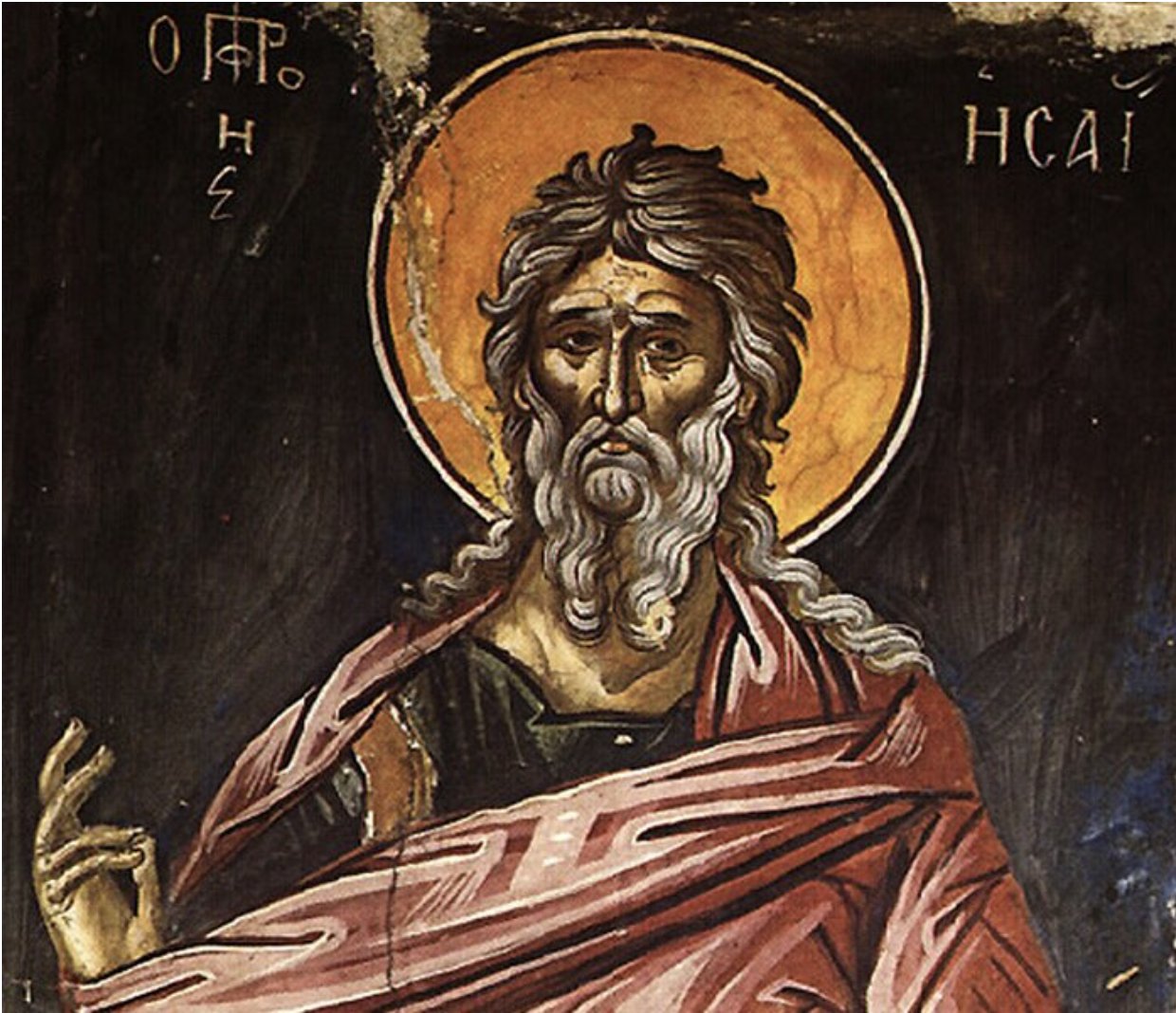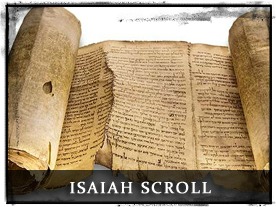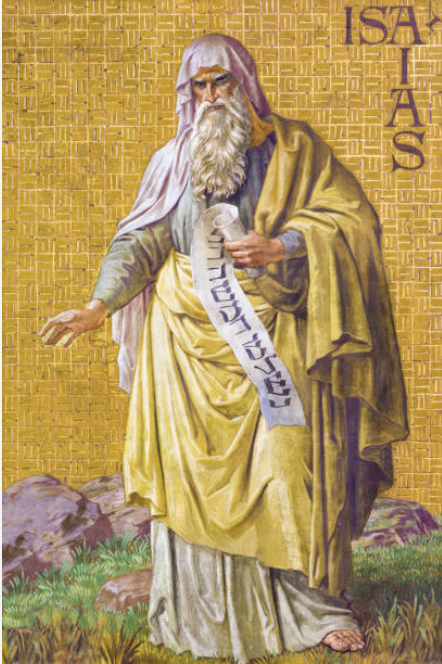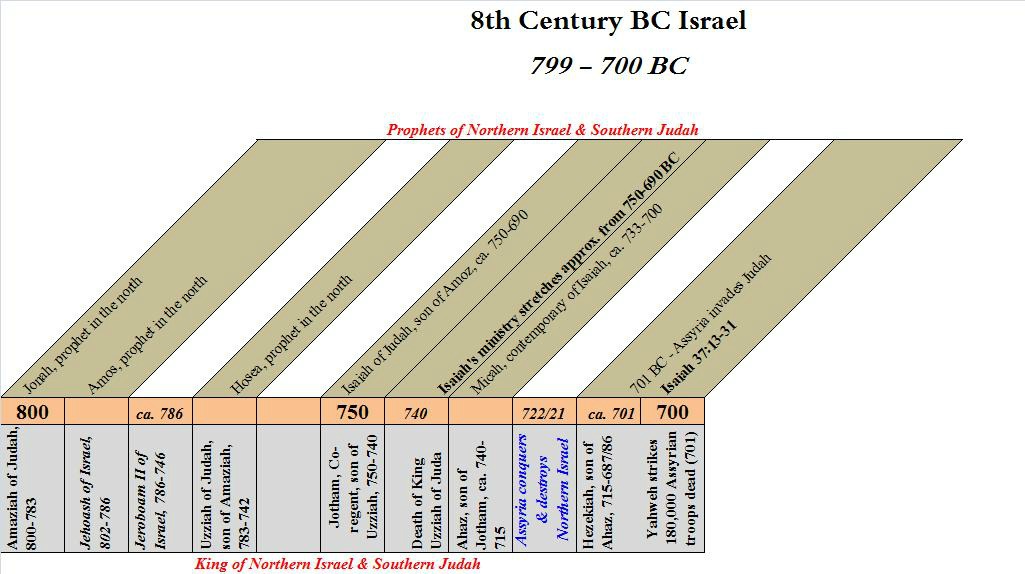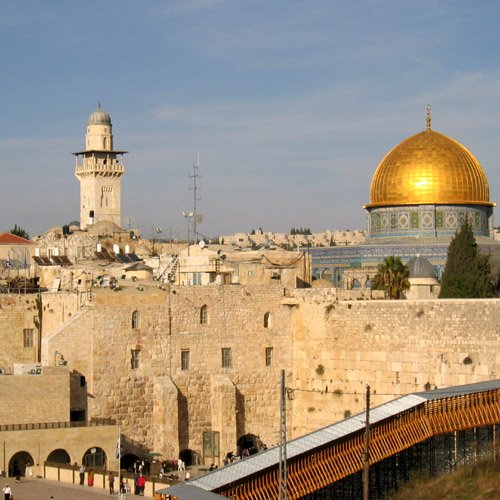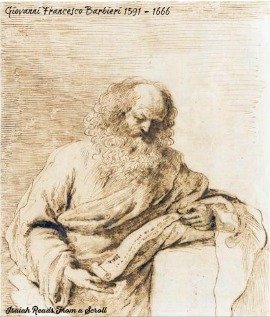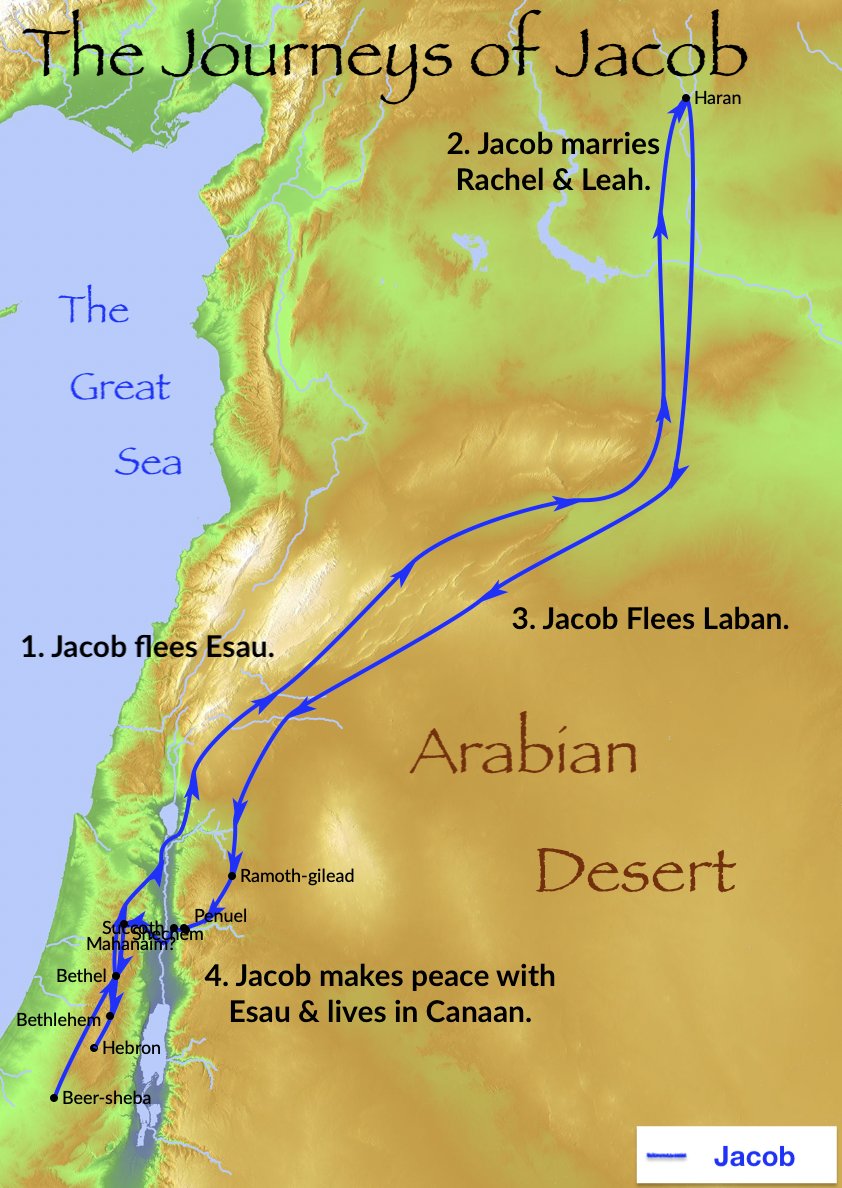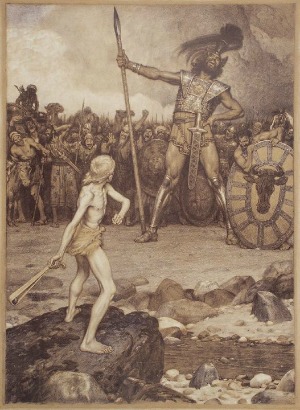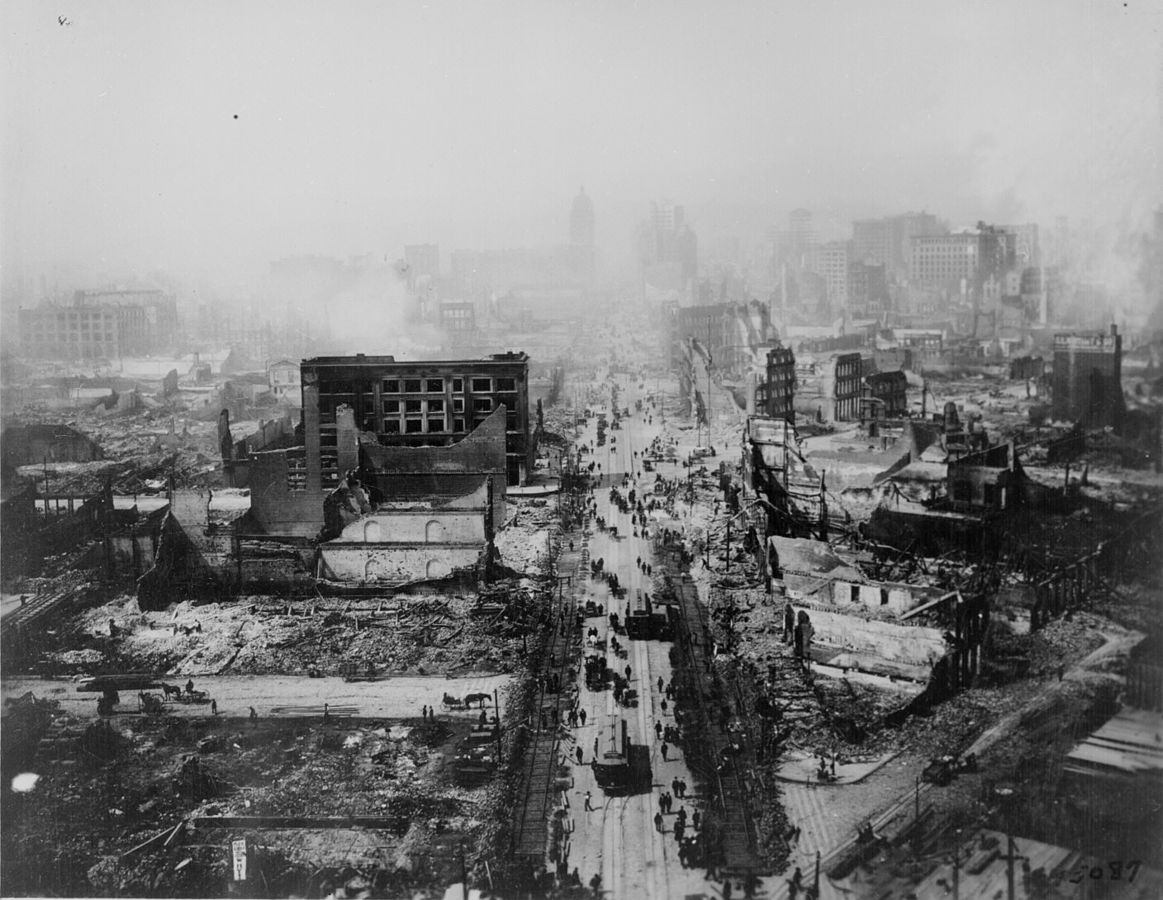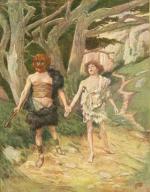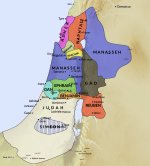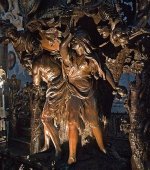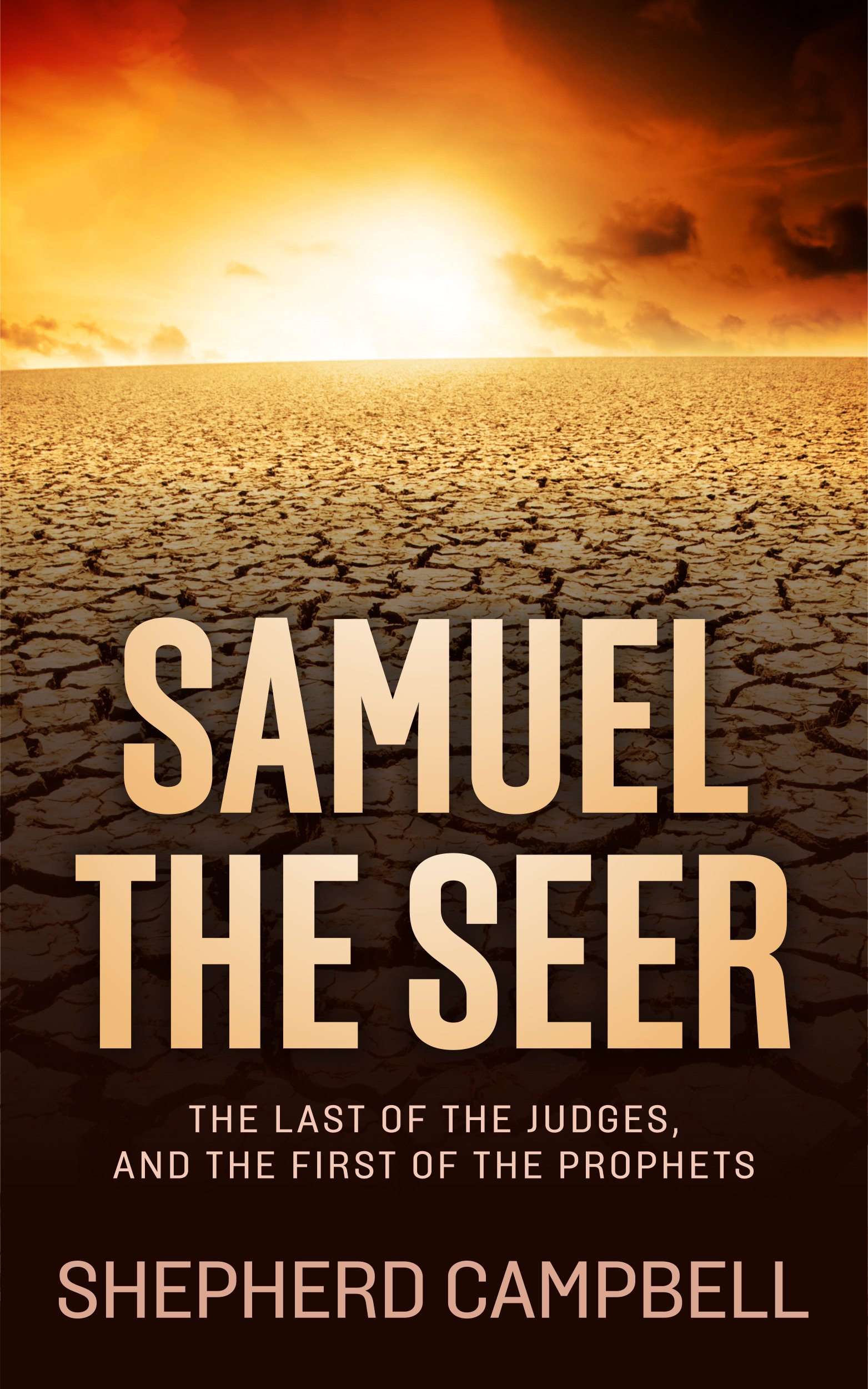- Biblical Maps
- Home Page
- History of Israel Blog
- Ancient Mesopotamia
- Map of Palestine
- Abraham
- Ancient Israel
- 12 Tribes of Israel
- Jerusalem
- The Book of Isaiah
- Palestine
- The Habiru
- Contact Us
- Bible Study Forums
- Media Page
- Visitors Sitemap
- Privacy Policy
- The History of the Old Testament
- In the Days of Noah
- The City of Jericho
VISIT OUR FACEBOOK PAGE!
ISAIAH 2
Length: Isaiah 2 is 22 verses long.
Date: No specific dates are mentioned in Isaiah 2 as to when this chapter was written. Holman's Commentary on Isaiah lists verses 1-5 as being composed around 701 BC; whereas verses 6-22 indicate a date closer to 740 BC. The reason being is verses 2-4 is a floating oracle (discussed below) which is also found in Micah 4:1-3. Micah was a contemporary of Isaiah and preached ca. 740 BC - the reason this date is given in association with the floating oracle in the opening verses of Isaiah 2. It must be kept in mind most dates given here are speculative, though the general time period of Isaiah's ministry is well documented fact. Some scholars (Ackroyd & Fohrer) argue Isaiah 2:1 is "a later intrusive addition" (Smith, p. 126); but Smith argues this conclusion is unlikely. The bottom line is the date of composition for Isaiah 2 is unknown.
Structure: The structure of the first 6 verses in Isaiah 2 has led many scholars to argue over when the verses were written, who wrote them, and were they later additions. The issues rest within the complex grammar and syntax of ancient Hebrew, and the difficulty at times in translating the ancient Hebrew (Smith, ps. 126-128.). Some have argued the opening verses of chapter 2, particularly verses 2-6, belong in the concluding verses of chapter 1 (Ackroyd & Fohrer). Their conclusion, however, is far from agreed upon. Others rest their suspicions on the exact oracles spoken of by Isaiah and Micah.
Who was the first to write it? Did they both draw on earlier sources? Or, did God simply inspire both to write the exact same phrase/oracle? These questions have no definitive answers, though Smith leans towards the notion that both prophets were drawing on past traditions and writings their Hebrew audience would've been familiar with. Regardless, the answers to these questions would not/do not change the overall meaning of Isaiah 2.
ISAIAH 2
Click on the link to see commentary on that verse.
vs. 2-4 "The Floating Oracle"
vs. 5-6
v. 10
v. 22
ISAIAH 2:1
"The word which Isaiah the son of Amoz saw concerning Judah and Jerusalem."
Verse 1 identifies the origin of chapter 2. The Bible identifies Isaiah as the son of Amoz, and speaks of "the word" which Isaiah "saw". By giving his father's name, the Bible provides proof for its audience Isaiah is a real person, with a real lineage, and a real message. People in the Biblical period were identified by their father's name. Verse one also reveals what we are about to read does not come from Isaiah, but from another source who revealed these things to Isaiah. The prophet, thus, saw these words being spoken by the original author and, in turn, is relaying them to the Hebrew audience in Judah & Jerusalem.
The Hebrew word translated as "saw" is CHAZAH, and was originally an Aramaic word that found its way into ancient Hebrew. It means: to gaze at, mentally to perceive, contemplate, to have a vision of, behold, look, prophesy, provide, see. Spiros Zodhiates reveals chazah to be used primarily in Biblical poetry, and about 50 times total in the Hebrew OT.
The word is reserved for those receiving special insight from God - which is how the prophets were able to prophesy. The books of Ezekiel and Lamentations give more insight into the nature of Chazah.
Ezekiel 7:26
"Disaster will come upon disaster, and rumor will be added to rumor; then they will seek a vision (chazah) from a prophet, but the law will be lost from the priest and counsel form the elders."
Lamentations 2:9
"...Also, her prophets find no vision (chazah) from the Lord."
Thus verse 1 makes it clear Isaiah is receiving his information from God alone. He is a true prophet. I Samuel 9:9 indicates that in ancient Israel prophets were also called "seers" - they saw the events they described. This special insight was given only by God; and as Bob Utley correctly points out, these visions were "given through a historically conditioned person, to a particular time and group, yet they are relevant for all people in all times!" (p. 41). Such is certainly the case for Isaiah 2.
What becomes apparent throughout Isaiah is that the prophet regularly speaks of both future events and present events, sometimes in consecutive verses, sometimes within the same verse. The trick is identifying which concerns the future, and which concerns the present (Isaiah's present, not ours). In the case of Isaiah 2, verses 2-4 give us a clear indication of what period Isaiah is speaking of.
ISAIAH 2:2-4
2 "Now it will come about that in the last days, the mountain of the house of the Lord will be established as the chief of the mountains, and will be raised above the hills; and all nations will stream to it. 3 And many peoples will come and say, 'Come, let us go up to the mountain of the Lord, to the house of the God of Jacob; that He may teach us concerning His ways, and that we may walk in His paths.' For the law will go forth from Zion, and the word of the Lord from Jerusalem. 4 And He will judge between the nations, and will render decisions for many peoples; and they will hammer their swords into plowshares, and their spears into pruning hooks. Nation will not lift up sword against nation, and never again will they learn war."
Isaiah 2 :2-4 is the Floating Oracle mentioned above. Floating Oracles are oracles/prophesies that appear in nearly verbatim forms amongst different prophets and books of the Old Testament. In this case, the prophesy is found also in Micah 4:1-3. It must be remembered that Micah and Isaiah were contemporaries, spreading their message around the same time, in the same area, and to the same people. Compare the two passages.
Micah 4:1-3
1 "And it will come about in the last days that the mountain of the Lord will be established as the chief of the mountains, it will be raised above the hills, and the peoples will stream to it. 2 And many nations will come and say, 'Come and let us go up to the mountain of the Lord and to the house of the God of Jacob, that He may teach us about His ways and that we may walk in His paths'. For from Zion will go forth the law, even the word of the Lord from Jerusalem. 3 And He will judge between many peoples and render decisions for mighty, distant nations. Then they will hammer their swords into plowshares and their spears into pruning hooks; nations will not lift up sword against nation, and never again will they train for war."
Similar prophecies are found in Hosea 2:16-23. In Hos. 2:16 the prophet says; "And it will come about in that day...". Similar to the opening of Isaiah 2:2 and Micah 4:1. Also, Hosea speaks of abolishing "the bow, the sword, and war from the land...".
Likewise, the shepherd prophet Amos uses similar imagery and language in Amos 9:11-15. The shepherd-prophet says "In that day I will raise up the fallen booth of David..."; and in v. 13 "the plowman will overtake the reaper and the treader of grapes him who sows seed...".
All four prophets speak of these events occurring, "in that day", or, "in the last days". This phrase indicates the events described will occur in the future. When in the future? During the Tribulation, which is clearly identified by the phrase "in that day", or " in the last days". Oftentimes this period is referred to as the time of God's wrath, or, the Day of God's wrath and judgement.
As discussed above, this phrase used by Isaiah places the events in the future, thus not events happening in the present. The phrase "in the last days" means Isaiah 2 should be read and interpreted within an eschatological context. During this period, the mountain of the Lord will be established as the chief mountain in the world, "and all the nations will stream to it."
Notice Isaiah says they will stream to Jerusalem. The image is not one of a gradual influx of people randomly wandering into Jerusalem, but rather an intentional and deliberate mass movement, a pilgrimage of sorts, by the nations of this earth to Jerusalem and God's Holy Mountain - Mt. Zion.
Isaiah 2:3 differentiates between Mt. Zion and Jerusalem, mentioning each place specifically. In Isaiah 66:20 God says all the nations will journey to "My holy mountain Jerusalem", thus indicating the entirety of Jerusalem as opposed to one specific mountain. It becomes apparent throughout Scripture two mountains hold special significance in Jerusalem.
The first is Mt. Moriah, or the Temple Mount. This is where Abraham obeyed God's voice to sacrifice his son Isaac. It is where the Western Wall stands today. The second was Mt. Zion, to the southeast of Moriah. These two mountains hold special significance. In the New Testament, Jesus spends a lot of time on the Mt. of Olives, which is across the valley west of the Temple Mount.
The universal inclusion of the entire world cannot be denied either in this passage. Isaiah is not addressing this passage solely to the Israelites, as he does in later chapters of Isaiah (see Isaiah 26). Rather, the events he saw included ALL of the nations of the earth - Jew & Gentile alike.
This is further evidence Isaiah 2 deals with future events - for at the time of Isaiah God was the God of Israel alone. However, it may not have seemed like that to the average Israelite of the 8th century BC. Judah lived in fear under the mighty shadow of Assyria. Her brethren in the north had been conquered and exiled. Enemies pressed in on all sides, and it may have seemed as if God had abandoned His people.
Isaiah is thus encouraging the Israelites by showing them what God will do for His people. Smith states, "the purpose for describing God's future kingdom was to present a vision of what God will ultimately do in Zion". Isaiah 2 is a message of hope; as well as a challenge to have faith and trust in God.
As debased and wretched as Jerusalem may appear in the eyes of the 8th century BC world, Isaiah 2:3 says there will come a day when the nations travel in droves to Jerusalem. Jerusalem will be the chief city in the world, and God will teach the nations "concerning His ways and that we may walk in His paths". This would have surely given the Israelites hope and encouragement in the face of severe adversity.
Smith points out an interesting fact about the Hebrew grammar used in verse 3. The phrase translated, "let us go up", is a cohortative verb in the Hebrew. In essence, a verb of this type is used to encourage people to join in on an activity already in progress.
In Isaiah 2:3 thus, Smith states the verb "is used to exhort others to join those who were already traveling to Zion." Picture a large group of people on pilgrimage; and as they walk, another large group sees them and joins them; and the people are encouraged to join in and the pilgrimage grows in size.
This will be the case with the nations traveling to Jerusalem. What a beautiful picture of global cooperation and peace as people travel together to worship God Almighty!
Isaiah emphasizes that never again will man learn war and do battle against each other. Such was certainly not the case during the 8th century BC - as the death machine of Assyria ruled the Ancient Near East. Neither is it likely to happen in today's volatile and unpredictable global climate. Nor has it happened in the time between. The oracle, thus, awaits fulfillment.
ISAIAH 2:5-6
"5 Come, house of Jacob, and let us walk in the light of the Lord. 6 For Thou hast abandoned Thy people, the house of Jacob, because they are filled with influences from the east, and they are soothsayers like the Philistines, and they strike bargains with the children of foreigners."
Verses 5 & 6 present an almost bipolar-like sequence of events. The end of verse 4 leaves the reader with a sense of paradise, of Eden recovered. The world has reached a state of pure peace and utopia with God. Verse 5 seemingly continues the utopian state with the same exhortation - "Come," - found in verse 3. However, this call is to the Jews only, signified by the phrase "the house of Jacob".
Jacob was the son of Isaac, the son of Abraham. Jacob was the patriarch renamed 'Israel' in the famous wrestling match with God, found in Genesis 32:28.
"And he said, 'Your name shall no longer be Jacob, but Israel; for you have striven with God and with men and have prevailed."
The Hebrew name Israel means "striver with God". Jacob/Israel would go on to have twelve sons, who would become the 12 Tribes of Israel. Thus when Scripture refers to the "house of Jacob", it is referring to the nation of Israel. In this instance Isaiah encourages the nation of Israel to walk in the light of the Lord - or walk in fellowship with YHWH their God.
That God and Jesus are considered to be light is a theme repeated time and again in the Old and New Testaments. Likely inspired by Isaiah, the great Apostle John wrote in I John 1:5;
"And this is the message we have heard from Him and announce to you, that God is light, and in Him there is no darkness at all."
This invitation in Isaiah is significant because it is aimed only at the Jews. They alone are invite to walk in the light of the Lord with God Himself. However, things quickly take a turn for the worse in verse 6 with a sudden and abrupt change in tone. Rather than utopia-bound in the light of the Lord, Israel finds itself heading in the other, completely opposite direction.
Isaiah 2 :6 is further fulfillment of a much earlier prophecy spoken by God Himself to Moses in Deuteronomy 31:15-17. In Deuteronomy 31 Moses is near his death. God is instructing Moses on what he is to say to Israel before he dies. Its a General's last bit of counsel to his troops. In verse 15 "the Lord appeared in the tent in a pillar of cloud". This pillar of cloud then "stood at the doorway of the tent".
What a fascinating image of God's presence in antiquity. He was making Himself seen to people via a pillar of cloud! From amidst the cloud He would then speak to Moses using actual, spoken, human language. The narrative picks up in Dt. 31:16-17.
"And the Lord said to Moses, 'Behold you are about to lie down with your fathers; and this people will arise and play the harlot with the strange gods of the land, into the midst of which they are going, and will forsake Me and break My covenant which I have made with them. Then My anger will be kindled against them in that day, and I will forsake them and hide My face from them, and they shall be consumed, and many evils and troubles shall come upon them;' "
This is clearly what Isaiah mentioned has happened to the houses of Jacob in verse 6 of Isaiah 2. Israel is said to be soothsayers - an interesting word and fascinating charge against God's people. The Hebrew for soothsayer is 'Anan - pronounced aw-nan.
The word literally means to cover, to act covertly, to practice magic. It has also been translated, a sorcerer, or an enchanter. It seems as if the Philistines, Israel's most feared enemy of the Old Testament, were particularly avid soothsayers and practitioners of the black magic.
The Philistines and Israel were constantly engaged in battle from about 1200 BC until the reign of David, ca 1000 BC. This time period covers, roughly speaking, the end of the book of Judges, I and II Samuel and the beginning of I Kings.
The two nations battled each other for land and supremacy, or perhaps more accurately, the Philistines battled for supremacy whilst Israel fought for their lives and very survival. Eventually King David subdued the mighty Philistines, even accepting some of them into his army as mercenaries. The Philistines were pushed to the margins of Canaan and eventually disappeared as a people.
However, the Philistine influence had crept into Israel's religious practices, specifically mentioned and forbidden by the Lord in Lev. 19:26. This was in accordance with what God had told Moses hundreds of years earlier in Dt. 31 mentioned above!
The penalty for such actions was God's withdrawal from Israel, and a host of calamities and disasters falling upon them as a consequence.
In Isaiah 2:9 part of the consequences are given as being the "common man has been humbled, and the man of importance has been abased".
Further consequences and examples of God's displeasure with Israel, and the terrifying consequence of His wrath, are depicted in verse 10.
ISAIAH 2:10-11
"10 Enter the rock and hide in the dust from the terror of the Lord and from the splendor of His majesty. 11 The proud look of man will be abased and the loftiness of man will be humbled, and the Lord alone will be exalted in that day."
These verses leave no doubt as to the intensity and devastation the earth experiences during this time of Great Tribulation. What makes this such a dreadful period? The "terror of the Lord" is being unleashed upon mankind and the earth we inhabit.
The Hebrew word translated as terror in v. 10 literally means; alarm, the object feared, great dread. Men will become so terrified they will literally hide in the caves and amongst the rocks as they seek to escape the terror of the Lord.
Isaiah speaks further of this dreadful time in Isaiah 2:19; "Men will go into caves of the rocks before the terror of the Lord,". And again in v. 21; "In order to go into the caverns of the rocks and the clefts of the cliffs before the terror of the Lord and the splendor of His majesty,".
What exactly is this "terror of the Lord" Isaiah speaks of? What type of event would lead men to seek refuge in caves and caverns? Isaiah speaks of total destruction world-wide, clear evidence this event has not occurred yet. Is there a future event the Bible speaks of that may lend insight into what Isaiah references here in Isaiah 2?
In fact there is, and the similar type of language and description used provides the link to identify this future event with Isaiah 2. Such an event can be found in Revelation 6:12-17. This section, in the NASB, is titled; 'The Sixth Seal - Terror'.
Verses 15-16 connect Revelation 6 with Isaiah 2.
"15 Then the kings of the earth and the great men and the commanders and the rich and the strong and every slave and free man hid themselves in the caves and among the rocks of the mountains; 16 and they said to the mountains and to the rocks, 'Fall on us and hide us from the presence of Him who sits on the throne, and from the wrath of the Lamb;"
The terror Isaiah speaks of is the same as the terror spoken of in Revelation 6. This future event is called The Wrath of the Lamb in Revelation 6. Revelation 6:12 identifies the event as "a great earthquake" which shakes the entire earth. Total devastation is experienced, so much so the "sun became black" and the "the whole moon became like blood".
Hebrews 12:26 depicts God saying, "I will shake not only the earth, but also the heaven." All of these verses speak of the same event. This event will most definitely terrify all of mankind here on earth. Can you imagine the panic that will break out? There will be a total breakdown of civic functions and society as we know it will cease to exist in its current state. Man will be terrified to the point they will look to hide themselves wherever they can - especially caves as they seek shelter from the elements.
What a remarkable demonstration of God's complete sovereignty and His timeless message. God weaves this prophecy in Isaiah 2 into the prophecy He gave John centuries later on Patmos - two messages, from two prophets and two time periods, from the same God - and both speaking to God's people and the earth as a whole about what awaits them should they ignore His words.
Isaiah 2:10-11 and Revelation 6:15-16 provide an excellent example of Scripture corroborating itself. The consistency of the Bible cannot be denied - even among those critics that want to deny its authority and authenticity. This example is simply one example of many in the Bible where two totally different passages speak of the same event in remarkably similar language.
These two books were written by different authors nearly a thousand years apart - Isaiah in the 8th century BC; and Revelation in the 1st century AD - under different political circumstances, and by authors of radically different lives, yet, the event spoken of and language used are eerily similar! How can this be?
Because the same Spirit inspired both men to write about the same event, using the same language, so as to emphasize the importance of living life in the here and now, of obeying God in this life and in this day - because a day of reckoning is most certainly coming, and man will not be able to hide.
ISAIAH 2:22
"Stop regarding man, whose breath of life is in his nostrils; For why should he be esteemed?"
Isaiah asks a very pointed question in verse 22 to conclude his sermon in Isaiah 2. The leaders of Israel, it must be remembered, were seeking political alliances and help from outside nations in order to fend off the mighty Assyrian empire. They sought help in every direction but up - i.e., from YHWH, the Holy One of Israel.
Isaiah 2:5-6 depicted the primary sin of the people during Isaiah's ministry - they had forsook the Lord, and sought after the ways and lifestyles of neighboring nations. This pursuit was not only along the lines of religious worship, but also in the arena of political alliances. Thus, Israel regarded their human neighbors more than they did their Supreme Creator.
Isaiah demands Israel stop regarding man over God. It is beyond his understanding why the leaders of Israel have chosen to seek man's strength over God's. Isaiah was not alone in his cry, however, as this is a theme repeated frequently throughout the Bible.
Romans 1:25 - "For they exchanged the truth of God for a lie, and worshiped and served the creature rather than the Creator, who is blessed forever. Amen."
Acts 17:24 - "The God who made the world and all things in it, since He is Lord of heaven and earth, does not dwell in temples made with hands; 25 nor is He served by human hands, as though He needed anything..."
Job 33:12 - "Behold, let me tell you, you are not right in this, for God is greater than man."
Psalms 56:11 - "In God have I put my trust, I shall not be afraid. What can man do to me?"
Unfortunately the story of Israel is much like the story of mankind as a whole - we repeatedly disobey God in pursuit of our own devices. The Israelites in Isaiah's time were no different than those that grumbled against Moses in the wilderness, and are no different than those of us on earth today.
We repeatedly seek what we want, the desires of the flesh, and in so doing we forget God and pursue that which is temporal and of the flesh. We, like Isaiah said, should stop regarding man and what man says is desirable and important - and instead focus on that which is permanent and eternal, our relationship with Jesus Christ.
Israel of Isaiah 2 sought after security and stability. In so doing they forgot the Rock of Ages, the Holy One of Israel, and sought after security and stability from that which in its very nature is unstable and insecure - the strength of man as represented by the nation of Egypt.
Mankind should heed the words of James, the half-brother of Jesus, as recorded in James 4:14:
"Yet you do not know what your life will be like tomorrow. You are just a vapor that appears for a little while and then vanishes away."
Nations rise and fall, leaders are born and die, empires conquer and are conquered. However, the Word of God has held firm, outlasting the dominant world empires of history, outliving the "great" men of the earth, and testifying to the timeless message and authority of God Almighty, Ruler of Heaven and Earth, Prince of Peace, Lord of hosts, and Holy One of Israel.
Recent Articles
-
The History of Ancient Israel
Dec 25, 23 02:16 PM
An easy to read history of ancient Israel from Old Testament times to today. -
The Ancient City of Jericho
Dec 18, 23 11:21 PM
The city of Jericho is one of the most ancient cities on earth. The city played a crucial role in a number of Bible stories. -
Story of Cain and Abel
Dec 17, 23 01:20 PM
The story of Cain and Abel is a tragic story of jealousy, rage and fratricide. It is the first murder in recorded history. -
The Twelve Tribes of Israel
Dec 17, 23 12:13 AM
The twelve tribes of Israel originated with the twelve sons of Jacob. -
The Tribe of Gad
Dec 16, 23 11:54 PM
The Tribe of Gad was a fierce tribe that participated in many of Israel's battles. They settled land east of the Jordan River. -
Life of Adam and Eve
Dec 11, 23 10:50 PM
The life of Adam and Eve was a blessed life meant to be lived eternally in Paradise. They lost Paradise, and ever since man has been looking for Eden.
SAMUEL the SEER
Now Available in Print & eBook on Amazon!!
POPULAR TOPICS
Learn more about these popular topics below. The Bible is full of fascinating stories, characters and mysteries!
BIBLE MAPS
Explore the land of the Old Testament! View these maps of the Bible.
